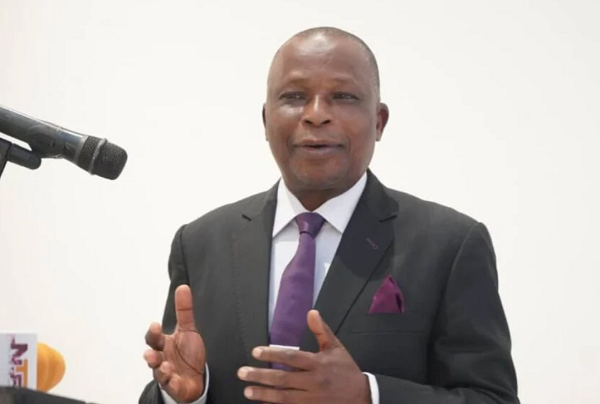Copyright thenationonlineng

The Attorney General of the Federation (AGF) and Minister of Justice, Lateef Fagbemi (SAN); Justice Helen Ogunwumiju of the Supreme Court; and rights activist, Femi Falana (SAN) have called for improved funding for criminal justice sector and continuous capacity building for its operators to ensure efficiency. Fagbemi, Ogunwumiju, Falana and others spoke in Abuja at a public lecture held to mark the 10th anniversary of the Administration of Criminal Justice Act (ACJA), signed into law by former President Goodluck Jonathan in 2015. The lecture, themed: “The Administration of Criminal Justice Act: The past, the present and the future,” was organised by the Centre for Socio-Legal Studies (CSLS), headed by Professor Yemi Akinseye-George (SAN). Fagbemi, who was represented by the Director, Administration of Criminal Justice Reform, Federal Ministry of Justice, Mrs. Leticia Ayoola-Daniels, said the future of criminal justice reform must be built on effective implementation of the relevant laws and not mere intentions. The AGF spoke about the many reforms and interventions undertaken by the Federal Ministry of Justice in the last few years, including the refurbishment of three courtrooms in Kirikiri Prison in Lagos, which he plans to hand over before the end of the year. The AGF stressed the need for continuous capacity building trainings for operators of the criminal justice system to increase its performance and ensure accountability. He said: “It is important that we promote non-custodial measures in sentencing. We need to leverage technology for speed, transparency and efficiency as this will help to decongest courts’ dockets.” READ ALSO: FULL PROFILE: Meet Chief of Defence Staff, Lt. General Olufemi Oluyede Justice Ogunwumiju, who was one of those instrumental to the birth of the ACJA, said although the ACJA is not perfect, it has positively impacted on the criminal prosecution system in the country. She encouraged criminal justice stakeholders to scale up their enforcement of the ACJA in view of its many innovative provisions. The Supreme Court Justice, who spoke about her experience as a magistrate, advised that trainings and capacity building efforts on the provisions of the ACJA should be directed at the magistracy level where majority of the criminal cases are handled. Justice Ogunwumiju also spoke about the need to involve the law enforcement agents, particularly the Investigating Police Officers (IPOs), who should be well tutored on what is required of them under the ACJA. She said it was important that magistrates are educated on issues like long detention, non-custodial sentencing, among others to enable them appreciate the implications of the orders they make. Falana, in his lecture, titled: “A decade of the ACJA: Charting the course for criminal justice reform in Nigeria,” argued that the criminal justice system, as it is currently constituted, discriminates against the poor. He noted that despite the transformative potential of the ACJA, persistent structural and institutional problems continue to hinder its full realization across Nigeria. Falana, whose lecture was read by Chionye Obiagwu (SAN) argued that challenges still being experienced in the criminal justice sector expose deeper governance deficits and demonstrate how criminal justice reform is inseparable from issues of political accountability, public finance, and human rights enforcement. He identified some of such challenges to include poor justice sector funding, weak implementation of the ACJA provisions, inadequate human capacity, low application of technology, among others. Falana said: “Poor funding translates to inadequate courtrooms, absence of stenographic recording, delayed case files and congested dockets which frustrate ACJA timelines. “The next phase of ACJA reform must integrate human rights and social justice. Equality before the law will remain fiction if the poor cannot access justice. “Legal aid must be constitutionally guaranteed and funded. ACJA implementation should be aligned with Chapter Two rights on welfare, education and social justice,” he said. Prof. Akinseye-George, who is the President of the CSLS, while addressing the press after the event, identified some salient recommendations contained in the presentations by all the speakers. The Senior Advocate who stressed the need for judges and magistrates to minimise the use of imprisonment as the only tool deployed to punish crime, assured that the various recommendations would be collated for necessary actions. He appealed to the National Assembly to urgently pass the Administration of Criminal Justice Bill, which is meant to correct some lapses noted in the 2015 ACJA, noting that the Bill had been before the National Assembly since 2023. Among other speakers at the event were former Chairman of the Senate Committee on Justice, Senator Dahiru Umar; former Chairman of the House of Representatives Committee on Justice, Prof. Ali Ahmad; Justice Joseph Oyewole of the Court of Appeal and the Director, Legal and Prosecution at the Economic and Financial Crimes Commission (EFCC), Sylvanus Tahir (SAN).



